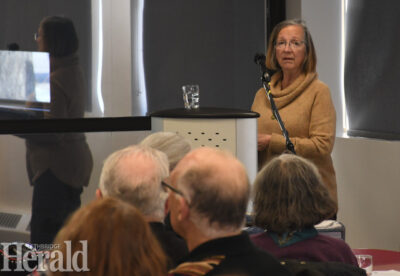Poverty remains a top issue in the city, SACPA told
By Ry Clarke - Lethbridge Herald Local Journalism Initiative Reporter on November 5, 2022.
 Herald Photo by Ry Clarke
Sharon Yanicki, spokesperson for the Social Health Equity Network of Lethbridge, speaks to audience members about the impacts of child and family poverty on our society and working towards ending those issues Thursday at the Lethbridge Senior Citizens Organization.
Herald Photo by Ry Clarke
Sharon Yanicki, spokesperson for the Social Health Equity Network of Lethbridge, speaks to audience members about the impacts of child and family poverty on our society and working towards ending those issues Thursday at the Lethbridge Senior Citizens Organization.The Southern Alberta Council on Public Affairs hosted Sharon Yanicki, spokesperson for the Social Health Equity Network of Lethbridge (SHENLA), at its weekly meeting Thursday.
Speaking towards SHENLA’s recent report on child and family poverty, (lethbridgeunitedway.ca under research and reports) and detailing to audience members the results and implications the data shows towards how we handle the issue in our city.
“I will be talking about why child poverty is an important issue for our city,” said Yanicki. “Also, I want to expand thinking about where are we in comparison to what is happening in Canada, in terms of what we know about the poverty situation. Expanding on opportunities for different groups to be involved in addressing poverty.”
Recommendations included the general public, regional and business sectors, service providers in the social safety network, local funders, and decision makers in federal, provincial, and municipal governments.
In the report, findings show in 2016 12,755 residents were living in low income housing in Lethbridge’s census metropolitan area.
“We need to understand that poverty is having impacts and costs across the healthcare system, social services, and across policing,” said Yanicki. “When we look at eliminating poverty, and the cost of having a plan to end poverty, it is cheaper than doing nothing.”
It was noted in the report the cost of poverty in Alberta is estimated to be between $8.4 and $11.4 billion in 2022.
Helping inform those in attendance of the issue, the talk also spoke focused on what is poverty and how we assess it.
“Some of you may think of absolute poverty, where you are homeless or you lack food and you cannot meet your basic needs. But it is much more than just absolute poverty. We are talking about relational poverty, being able to participate in community life,” said Yanicki. “Poverty is racialized, if you are a member of a group who self-identifies as a racial group member […] you have higher rates of poverty as well. 2016 data told us 20.8 per cent of people with racialized identities were living in poverty, compared to 12.2 per cent for non-racialized people.”
With a thought-provoking discussion on how society handles poverty and the ways to solve the issue, Thursday’s discussion helped educate the awareness for those at risk. “Child poverty is associated with a negative cascade of impacts across the whole life course,” said Yanicki. “SHENLA is promoting collective impact, people working together to address a common agenda, a common issue, and from many different sectors of society to try and create change.”
11-10




